|
Preparing for a teacher training interview can be a daunting experience. But with the right preparation and mindset, you can feel confident and ready to impress. In this blog post, we'll provide you with our top tips for a successful primary teacher training interview.
Tip 1: Research the Programme Before your interview, research the teacher training programme you're applying to. This will show your interviewer that you're genuinely interested in the opportunity and have taken the time to understand what the programme is all about. Tip 2: Prepare Answers to Common Interview Questions There are some common interview questions that you're likely to be asked during your teacher training interview. Prepare answers to these questions in advance, and practice delivering them with confidence. Example questions could be:
Tip 3: Dress and Act Professionally First impressions count, so it's essential to dress and act professionally during your interview. Dress in formal business attire, arrive on time, and maintain good eye contact throughout the interview. Tip 4: Demonstrate Your Passion for Teaching Primary school teaching requires passion and enthusiasm. During your interview, demonstrate your passion for teaching by giving examples of your experience working with children and your desire to make a difference in their lives. Tip 5: Be Yourself Be yourself during the interview. Remember, the interviewer wants to get to know you and your personality, as well as your experience and qualifications. So, relax and be yourself! Tip 6: Follow Up After the Interview After the interview, send a thank-you email to your interviewer. This is a great opportunity to reiterate your interest in the programme and thank them for their time. Conclusion A teacher training interview can be a nerve-wracking experience, but with our top tips, you'll be well-prepared to showcase your skills and impress your interviewer. Remember to research the programme, prepare your answers, dress and act professionally, be yourself, and follow up after the interview. Good luck!
0 Comments
Dyslexia is my teaching superpower. It took me a while to believe this but now it is my driving force in being the teacher I always needed as a child.
Whilst completing my undergraduate degree in childhood studies, I decided I wanted to train as a teacher. Since a child I have always wanted to be a teacher but was afraid that my dyslexia and auditory processing disorder would stop me. I met a teacher at a wedding during the second year of my degree and, when I explained my worries, he disclosed that he was also dyslexic but is still thriving as a teacher. We stayed in contact, and he helped me with my application and interview for each training provider during the final year of my degree. I have always been very honest about my dyslexia, but people have very different understandings of what it means. I can read very well and do not see letters the wrong way round. However, I don’t know left from right, I struggle to remember instructions, and my spelling is awful. As I also have auditory processing disorder this means I often mishear people, pronounce words incorrectly and hate loud environments, something which is impossible to avoid in a classroom with 30 six-year-olds! My dyslexia had never been such a barrier as it was during teacher training. Throughout my teenage years into my twenties, I have always used technology. Siri is my best friend; I simply say a word into my phone or watch and the word appears ready for me to copy. Throughout my degree my mum read every essay to proofread it for me. Spell check is great, but I often spell a correct word which is not the word I meant to type. Yet in class neither Siri nor my mum are there to help me spell in front of 30 children. Thirty little eyes staring at me, as I attempt to write down their sentences on the board. It brought back some awful memories from school where I was asked to write on the whiteboard with the whole class laughing as I struggled to spell basic words. I came home from my first day on placement and thought ‘I can’t do this’. I spent the first week crying every day ready to quit, but I loved the children and didn’t want to leave them. I came up with my own strategies. I would always write any words I will need for the day on a post-it note and stick it to my lanyard (asking Siri first of course). I also pre-read any books to myself and ask someone how to say a word I’m unsure of and then phonetically write the word for myself so I remember how to say it. However, this still wasn’t enough; the children would call out amazing vocabulary during English and I wouldn’t be able to write it on the board. I’m sure many people are thinking, just use a dictionary! But when you don’t know what letter the word starts with they are useless. This is when I realised that I needed some extra help. I spoke to my amazing training providers about my struggles, and they really supported me. They allowed me to find a great e-reader pen and purchased it for me as well as encouraging me to speak to my class about my dyslexia. I was able to find a great book which explains dyslexia to small children. My class teacher was great and understands that I can’t cope with lots of instructions all at once so allows me time to write them down. She also will often tell me that I’ve missed a letter out of words I have written on the board. I need someone to act as a spot checker for me. I can spell the word ‘what’, yet I will often write it on the board and forget a letter but not realise. This has created not just a supportive relationship for us but also for all the children. They love when I spell something wrong, and they can correct it. They are more empathetic to their peers. To children, their teachers are geniuses; they can see that I’m a clever person I just struggle with some things but that doesn’t take away from my intelligence and they can now see that in their peers. It was challenging to explain my spelling difficulties to the children. I can’t learn new spellings. One assumption of dyslexia is that I am just not trying hard enough. I went to spelling intervention throughout school, one year I took a spelling test at the beginning and the end of the year. I got worse, I scored two less than the start of the year. A whole year spent playing spelling games for an hour a week and I hadn’t improved at all, in fact I’d seemingly got worse. I do not spell words the same way every time, sometimes I’m lucky and get the letters in the correct order but if I were to spell the word minutes later it could be wrong. I simply cannot learn new spellings without incredible struggle. How can I say this to my class and yet expect them to listen to me bang on about spelling rules? I explained to them that I had to work doubly hard throughout my education and that I am still learning now. My ‘magic pen’ has provided me with more independence. I no longer have to ask some how to read a word, instead I simply glide the pen over the word, and it reads aloud to me. I also have words stored in the pen. I change them every few weeks depending on what I am teaching. I still rely on the use a dyslexic dictionary and if all else fails, I return to Siri on my smart watch. As I have built my confidence around talking so openly about my dyslexia, I am also more open speaking to other teachers. My experience of teachers was that very few understood dyslexia and assumed I wasn’t very intelligent. I only left school myself five years ago and so I can only imagine that many teachers still hold the same assumptions. I will never stop contradicting these believes and advocating for these children. I hope that when someone I’ve taught is later diagnosed with dyslexia, they can think of me and understand that you can do anything, with hard work and the help from some technology. My advice for anyone thinking about going into teaching with learning disabilities is to be honest and go for it. I was fortunate to have multiple acceptances with different training providers, but I selected Exeter Consortium because the people were so caring and understanding. You need to be in a place where you can be honest and know you will receive support. It is hard work, but it is so worth it.
Why do you want to be a teacher?
It sounds cheesy and cliched, but genuinely so that I can make a difference! Primary school is some of the most formative, important years of a child’s life and if I can be there to help them learn and navigate those then I will have helped. Also, like a lot of people, I was also inspired by some amazing teachers that I had at primary school who made learning fun and accessible and I want to be that person for other children. What qualities do you have that you think will help you be in the teaching profession? Flexibility – you have to be able to adapt plans at a moment’s notice! Resilience – you’ll be tired and there will be lessons that are hard but you have to keep going. Empathetic – there will be circumstances outside of the classroom that will affect the children that you teach and you might need to be a good listener for them. Why did you choose Exeter Consortium Schools’ Alliance as your training provider? I chose Exeter Consortium because of the really friendly vibe that it gave off. From the first email correspondence after I had applied and throughout the interview process I felt completely supported and like the team really care about every trainee that they have and their journey to become a teacher. Have you found Exeter Consortium to be supportive and welcoming? Absolutely! The course leaders have been so supportive in making sure that we are getting everything that we need from the course to make us the best teachers possible. Everyone on the course including the staff and also fellow students have been very welcoming and it’s a very supportive environment where trainees are all swapping advice and looking out for each other. Describe your time training to teach in three words: Rewarding, enlightening and fast-paced! A little about Lydia
I have been working as a Primary School teacher in Year 2 since January. Prior to this I had volunteered in a local Primary School and had experience in all year groups. I have wanted to be a teacher for as long as I can remember (cliche I know), but it is true. This became clear when I started volunteering in my local Primary School. I saw the sheer passion teachers had for their pupils and the extreme pride throughout. After volunteering for some time, I started to lead small group activities and took part in some classroom routines. Seeing the progress children were making made me love being part of their learning even more! Applying for Teacher Training After 2 years of my first degree I started considering PGCE options for when I had finished. I knew I wanted a school-based approach and soon came across Exeter Consortium. They had a range of glowing recommendations, all of which were very accurate. I decided I would call them, not really knowing what for. After speaking with a member of the team I felt I understood the course structure. I was adamant I wanted to do this course so started my UCAS application. I only put Exeter Consortium on my application (I do not recommend, as it is very risky) but I was certain I didn’t want to train anywhere else! I completed my interview with them and was very lucky to be offered a place. My favourite aspects of Teacher Training: My favourite aspects of the course were the individualised targets which helped me develop efficiently and effectively and were based on regular observations. This prepared me for interviews and for regular observations as an ECT. I found Exeter Consortium to be the most supportive, welcoming, and encouraging course. They provided me with the tools and skills to become a confident teacher. As a trainee I lacked self-belief, as an ECT I am confident in my teaching practice, thanks to Exeter Consortium. Describe Exeter Consortium Schools’ Alliance in three words! If I could describe Exeter Consortium training in 3 words it would be supportive, engaging and fulfilling. My advice to any future trainee teachers is, trust the process, it is a challenging year, but it is 100% worth it. Be honest with yourself, your mentors and course leaders about what you can do and when you need guidance or support. I can say I would do my training all over again if needed because without it I wouldn’t have my amazing class who make me laugh every single day! Lastly, teaching is the BEST job ever! Trust me, you won’t regret it. |
Categories
All
Archives
July 2024
|

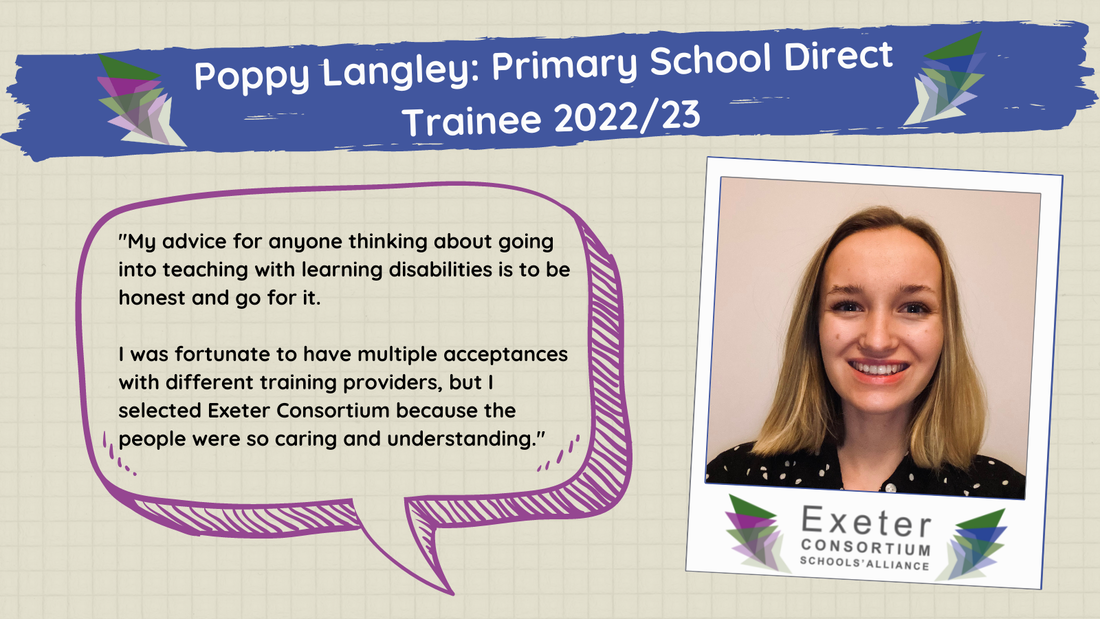
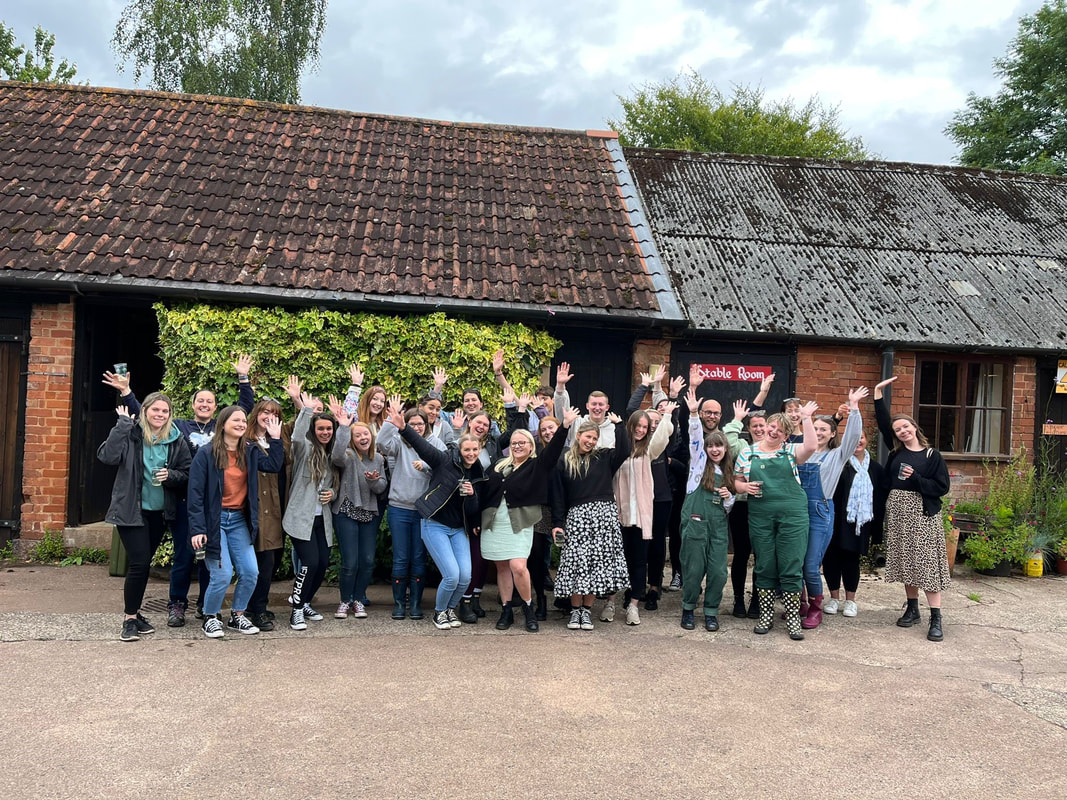
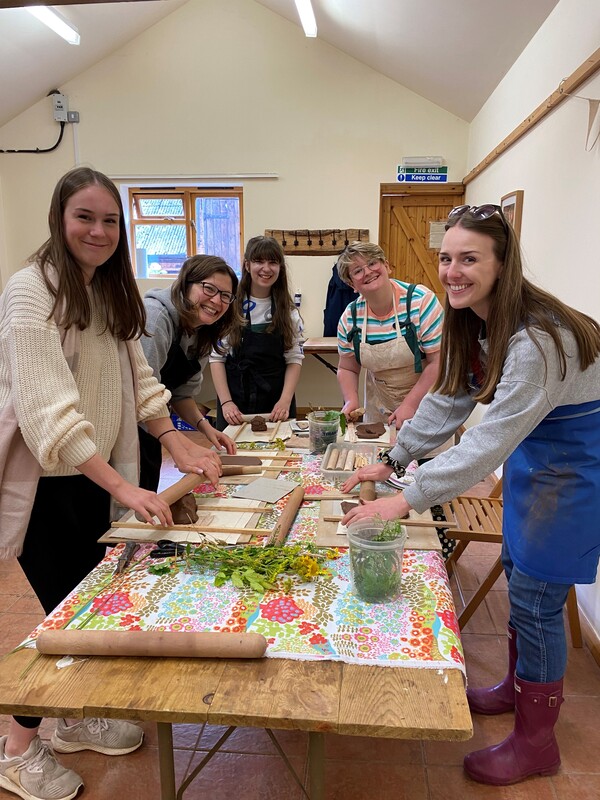
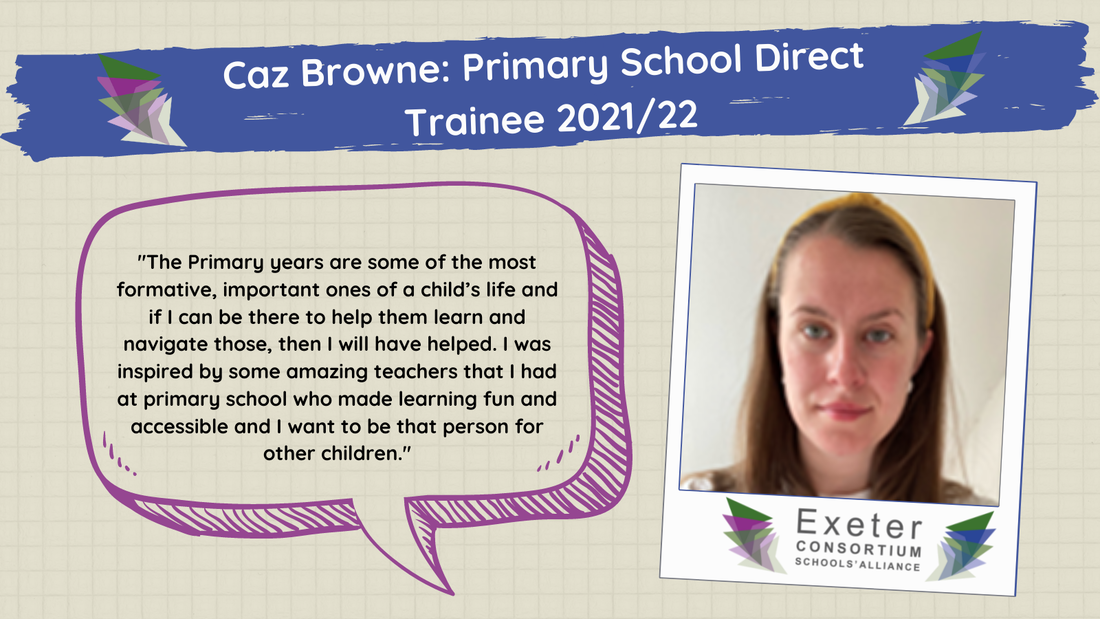
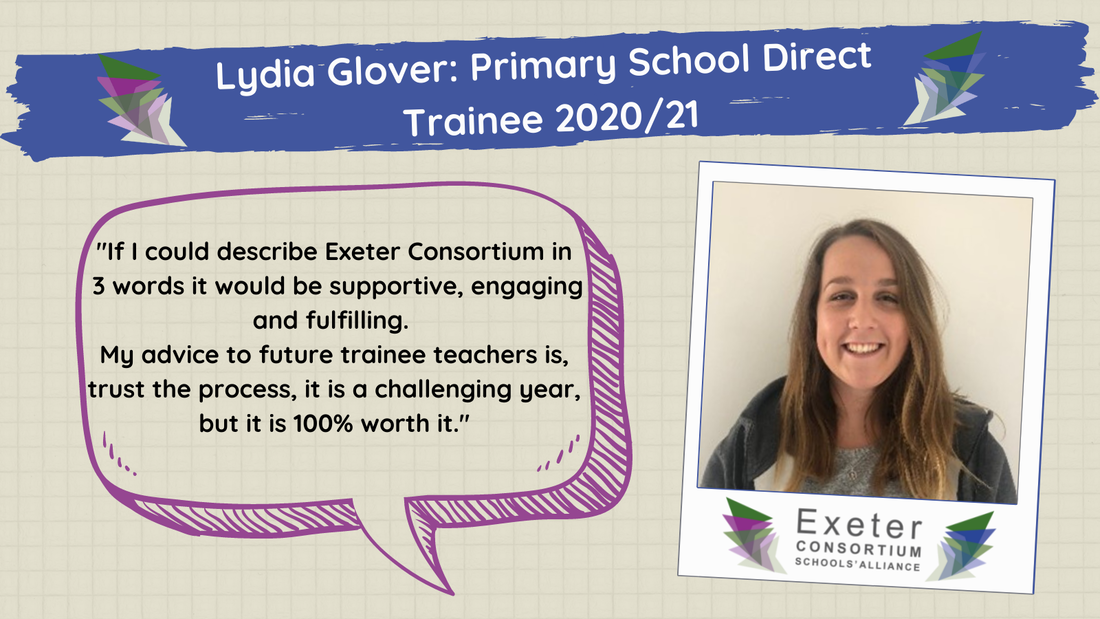
 RSS Feed
RSS Feed


